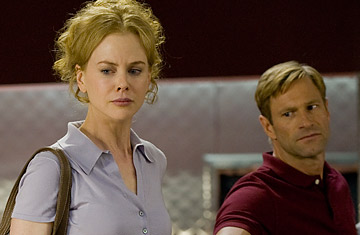
Nicole Kidman and Aaron Eckhart in Rabbit Hole
(3 of 3)
7. Little White Lies
With more than 300 slots to fill and 300,000 tickets to sell or dispense, the Toronto selection committee is always happy to showcase a new work from a director whose last film was an art-house hit. Hence the inclusion of Little White Lies by Guillaume Canet, whose adaptation of the American novel Tell No One attracted more admirers than it should have. Whatever the merits of that insufficiently compelling thriller, it seems like a masterpiece compared with this meandering Gallic version of The Big Chill. A group of friends take a vacation each August at the beachside home of their eldest member — and most of them will do it again this year, even though one is in the hospital recovering from a motorbike accident. The presence of the incandescent Marion Cotillard, along with such accomplished actors as Benoit Magimel (The Piano Teacher) and François Cluzet ('Round Midnight), may lure the careless cinephile. But be wary: each character has exactly one trait, tiresomely recombined with other characters over the film's 2½-hour span. The occasional emotional or comic connection can't redeem Little White Lies. —M.C.
8. The Trip
Accompanying his fellow actor and friend Steve Coogan on a weeklong road journey from London to fine restaurants up north, Rob Brydon suggests they stop to dine at an ordinary place serving food eaten by real people. When Coogan demurs that that's been done before, Brydon says, "It's 2010. Everything's been done before. The only thing is to do something everyone's done before but do it better or different." In a festival clogged with strained seriousness, The Trip is different: the semi-real, semi-improv display of two funny men enduring each other's company. (It's the theatrical version of a soon-to-be-aired six-part BBC series.) Similar to the 2004 Sideways in its setup and time frame, The Trip has Coogan on the prowl for sexual encounters as well as elegant repasts and Brydon as his more stay-at-home companion. The two actors played together in the shaggy period caper Tristram Shandy, and that film's director, Michael Winterbottom, is again at the helm. But the stars' badinage is the real treat and definitely worth catching if the movie (or the TV show) ever comes to the States. Do not, however, bring a beverage into the theater. While watching Brydon and Coogan's dueling impressions of Michael Caine, Sean Connery and Hugh Grant, you may laugh so hard that liquid will come out of your nose. I speak from experience. —R.C.
9. Meek's Cutoff
Director Kelly Reichart and writer Jonathan Raymond, who collaborated on the austere indie dramas Old Joy and Wendy and Lucy, go epic this time, but with the same mute admiration for outsiders in a hostile land. Set in the Oregon Territory in the 1840s, the movie tells of a small cluster of pioneer men and women (including Wendy and Lucy star Michelle Williams) who must rely on a grizzled, garrulous mountain man (Bruce Greenwood) to lead them to the promised land ... or astray. What J. Hoberman wrote in the Village Voice of Old Joy — that it is "literate but not literary, crafted without ostentation, rooted in a specific place and devoted to small sensations" — is also true here. These are the movie's strengths and weaknesses: an uninflected attention to the minutest detail and a minimalist's abhorrence of dramatic impact. Worthy and wearying, Meek's Cutoff stirs an admiration for the beset settlers while begging the question of how anyone ever reached the Pacific Coast. —R.C.
10. Balada Triste de Trompeta (The Last Circus)
Before it ever played Toronto, Alex de la Iglesia's Spanish horror film was both denounced — as a lurid panorama of degradation and self-mutilation — and laureled: the Venice Jury, headed by Quentin Tarantino, gave it Best Director and Best Screenplay. The movie offers plenty of reasons to be either appalled or enthralled. Spanning virtually the full history of Franco's Spain, it opens in 1937 with a machete-wielding killer clown and ends in 1973 atop the huge cross in Franco's Valley of the Fallen. The central story of two men, a sadistic Happy Clown (Antonio de la Torre) and a soulful Sad Clown (Carlos Arecas), who love the same gorgeous acrobat (Carolina Bang) could be a parable, in grotesque whiteface, of the Franco period, which the writer-director sees as the domination of the brutal right over the ineffectual left. The acrobat might stand in for the Spanish people: she's sexually abused by Happy Clown, and she loves it. Beginning in carnage and soaring into surrealist tragicomedy, Balada Triste is a film hell-bent on madness and in full control of it. Is it the best movie in Venice and Toronto or the worst? Could be either. But it was surely the most. —R.C.
